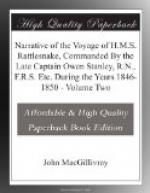It would appear that their difficulties commenced at the outset, as many weeks passed before they got clear of Rockingham Bay, its rivers, swamps, and dense scrubs, fenced in by a mountain chain. Six weeks elapsed before they were enabled to pursue a northerly course, the scrubs or dense brushes still continuing, requiring the party to cut their way. The carts were abandoned on July 18th, and the horses were packed. Sickness early made its appearance, the stock of provisions was getting low, the horses long failing in strength were dying of weakness, and their flesh was used as food.
On November 10th, or upwards of five months after leaving Rockingham Bay, having made less than 400 miles in a direct line towards their destination, and three of the party having been completely knocked up, and the remainder in a feeble state; nineteen of their horses dead, and their provisions reduced to one sheep, forty-six pounds of flour, and less than one pound of tea—Mr. Kennedy resolved to form a light party consisting of himself, three men, and the aboriginal Jackey-Jackey, and push on for Cape York, distant about 150 miles, to procure assistance for the remainder, and save them from impending death by the combined influences of sickness, exhaustion, and starvation.
On November 13th Kennedy started, leaving eight men at the camp at Weymouth Bay. Near Shelburne Bay one of the party accidentally shot himself, and another was too ill to proceed; consequently, it was determined to leave them behind in charge of the third man, with a horse for food, while Kennedy and the black pushed on for Port Albany. At length near Escape River, within twenty miles of Cape York, a tribe of natives with whom they had had some apparently friendly intercourse, tempted by their forlorn condition and a savage thirst for plunder, attacked them in a scrub and with too fatal success, as the gallant leader of this unfortunate expedition breathed his last after receiving no less than three spear wounds. The affecting narrative of what passed during his last moments as related by his faithful companion, is simply as follows: “Mr. Kennedy, are you going to leave me?” “Yes, my boy, I am going to leave you,” was the reply of the dying man, “I am very bad, Jackey; you take the books, Jackey, to the Captain, but not the big ones, the Governor will give anything for them.” “I then tied up the papers;” he then said, “Jackey, give me paper and I will write.” “I gave him paper and pencil, and he tried to write; and he then fell back and died, and I caught him as he fell back and held him, and I then turned round myself and cried; I was crying a good while until I got well; that was about an hour, and then I buried him; I dug up the ground with a tomahawk, and covered him over with logs, then grass, and my shirt and trousers; that night I left him near dark.”




